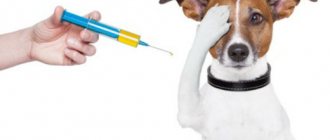Photo from the site https://kto-chto-gde.ru
Having your own dog is the dream of many children and adults. Therefore, when a pet appears in the family, the owners think not only about toys and treats, but also about the health of their new friend.
To make an informed decision about whether your dog should be vaccinated, we recommend reading our article. From it you will learn: what vaccinations and why and when are they given to dogs, what four-legged friends should not do after vaccination, how long the quarantine lasts after and much more.
What is a vaccine and how does it work?
From the very beginning, we would like to note that there is no single schedule for dog vaccinations. The veterinarian makes the final vaccination plan depending on a number of factors: the pet’s living conditions, its contacts with other animals and people, the general state of immunity, the ecological situation of the region regarding infectious diseases, as well as the absence or presence of rabies.
The “injection” that we mean when we talk about dog health means a special vaccine that protects the animal’s immunity from disease. They are administered to dogs at a certain time.
The vaccine helps create artificial immunity to certain infections and diseases in the body of your four-legged friend.
Thanks to the weakened infection introduced into the body, it will be able to recognize it in the future and develop protection with the help of special cells, which will prevent the disease.
What will happen if you don’t bet
Refusal to vaccinate is a huge risk. The dog remains unstable to pathogens of dangerous diseases, from which the probability of death is extremely high. A sick pet becomes a “source” for the spread of the virus to both domestic and wild animals. Mass infection entails an epidemic and subsequent quarantine of the area.
The causative agent of rabies is especially dangerous. Both animals and humans can become infected with it. It is impossible to recover from it; the carrier dies in agony. If cases of rabies are periodically recorded in the territory, refusal to vaccinate is a double risk.
Wild animals are carriers of dangerous diseases. In times of famine, they come to cities where they spread viruses and bacteria.
It is a mistake to think that purebred dogs do not need vaccinations, since they already have “street” immunity. Pets picked up from the street are hardier and more resistant to certain diseases than their purebred counterparts. But their body is not able to resist plague or rabies on its own.
How does dog immunity work?
Whether to vaccinate your animal - today in Russia this question is decided only by the pet owner. There are cases where a dog without vaccination has pleased its owners with good health for many years, and sometimes a five-month-old puppy suddenly dies from an unknown infection. Dogs, like other warm-blooded animals, have two types of immunity: inherited (this is due to genetic characteristics) and acquired.
Inherited immunity is considered more durable because it develops in the natural environment and is passed on from generation to generation.
Acquired protection can develop in a pet in two ways: due to a previous infection or as a result of vaccination. This protection gives puppies active resistance to disease for a period of fifteen days to several years. For this reason, if you visit the veterinarian in advance, there will be no danger to her health from all kinds of diseases and infections.
Can a vaccine be harmful?
With the help of a vaccine, a virus is introduced into the animal’s body, which has been weakened or killed by special manipulations. To develop immunity, the puppy must have a lot of strength and no health problems. Otherwise, it will be difficult for the defense mechanism to overcome hostile bodies, and the baby may become infected with the drug for which he was injected.
To prevent such cases, it is prohibited to vaccinate:
- weakened and sick dogs;
- puppies that have been in contact with presumably sick animals;
- medications that have expired or whose storage and transportation conditions have been violated: under direct sunlight, in conditions of high temperature or humidity;
- if there is a possibility that the kitten is infected;
- if less than 2 weeks have passed since antibiotic therapy;
- before and after any surgical interventions.
If you suspect that your pet has any disease, including the one against which vaccination is being carried out, it is necessary to submit urine and blood for testing. Their result will make it possible to verify the absence or presence of the virus in the baby, even if there are no characteristic manifestations of infection.
Types of vaccinations for dogs: to give or not
Photo from the site https://vetklinikaspb.ru
There are two types of vaccines known in veterinary medicine: live attenuated and non-live. The latter cannot cause discomfort even in sick dogs, for this reason such intervention is considered safe. But immune protection is not durable and strong, which cannot be said about a live vaccine.
Therefore, vaccines with active microorganisms are most preferable, but are only possible in completely healthy pets.
Vaccines are also distinguished by the number of antigens used. Thus, there are mono-vaccines (they provide protection against only one pathogen) and complex vaccines (they already contain several pathogens).
Dogs are protected against rabies with a single vaccine.
Why is vaccination necessary?
Young puppies gain immunity from their mother's milk. However, this type of protection is only temporary and after stopping milk feeding, the offspring loses the ability to resist bacteria. Therefore, from a young age, puppies undergo routine vaccination.
Before vaccinations, puppies should not be taken for walks. The street is teeming with dangerous bacteria and viruses that your puppy can pick up anywhere. Very often they become ill with canine distemper, since their defense mechanisms have not yet encountered the causative agents of the disease.
In addition, a person himself can bring harmful microorganisms from the street. For example, worm eggs can settle on shoes and then spread throughout the house.
In some cases, vaccinations are contraindicated. Pets with weak immune systems are not given the vaccine, as it may cause a negative reaction. Pregnant dogs and puppies under 2 months cannot be vaccinated. If the pet has not undergone routine deworming, it is also not vaccinated.
What vaccinations do dogs get?
The question of what vaccinations a dog needs per year and whether they need to be done annually, as well as whether there is a list of vaccines that dogs receive every year, worries many owners of four-legged family members. We present a typical vaccination schedule, which contains 5 diseases.
- From rabies. This disease affects all warm-blooded animals, including humans. There is no point in treating rabies. Almost one hundred percent of individuals affected by this disease die. In urban environments, dogs and cats are the main sources and distributors of the virus. For this reason, veterinary legislation requires that all puppies over three months old must receive a vaccine against this terrible infection.
- From the plague of carnivores. This infection is an incredibly contagious disease that is extremely common among our four-legged friends. It is difficult to treat and often becomes chronic, causing the pet to die, suffering from seizures and paralysis due to damage to the nervous system.
- From parovirus enteritis. This infection is widespread everywhere and has the highest percentage of deaths. It is characterized by diseases of the intestinal tract, liver and pancreas. The disease is especially devastating for humans' little friends and puppies, causing debilitating nausea and diarrhea followed by rapid dehydration.
- From viral hepatitis. In puppies, this infection is diagnosed in an acute form with an extremely high mortality rate. In pets who have crossed the threshold of three years of age, this disease is usually registered in a chronic form.
- From leptospirosis. An infection with this mysterious name affects both pets and free-ranging predators. Humans can also become infected with leptospirosis. During illness, the stomach, liver, and kidneys are damaged - all this gives impetus to the development of jaundice.
- From coronavirus infection. This type of infection damages the lining of the small intestine. The disease passes without symptoms and does not cause serious harm. The vaccine against this infection is not included in the standard vaccination schedule. But if the owner of the animal wishes to vaccinate due to the high risk of infection with parvovirus enteritis (these infections mutually aggravate the course of the disease), the veterinarian can give an injection.
- From parainfluenza. This disease negatively affects the upper respiratory tract - inflammation occurs, cough and runny nose appear. The infection itself is relatively easy to tolerate, but unpleasant consequences in the form of pneumonia are possible. Because of this, dogs that live in groups or are kept in unfavorable conditions are vaccinated to be on the safe side.
This is the most detailed list of what vaccinations are given to dogs today.
Sometimes in regions, annual injections include vaccination against tick-borne borreliosis (Lyme disease), various fungal diseases (trichopytosis and micropsia) and piroplasmosis.
Usually, after the injection, the vaccine should spread throughout the animal’s body itself and pass without leaving a trace. But why then did the dog have a bump on its withers after vaccination?
It can appear for several reasons:
- The solution was injected too quickly and did not have time to spread throughout the body, but formed a compaction.
- Perhaps the veterinarian used a needle that was too short, due to the size of which, the vaccine got into the subcutaneous fatty layer of the skin and simply cannot spread to other tissues.
- The appearance of the lump is also influenced by the quality of the vaccine itself, its structure, temperature and much more.
- If a blood vessel was hit during the procedure, the bump may be a simple bruise.
The swelling itself at the withers after the injection should not frighten the owner of his four-legged friend. But if it begins to sharply increase in volume, purulent discharge appears from it, or the pet is apathetic and refuses to eat for more than three days, you should immediately contact a specialist.
From what diseases
Now vaccination allows you to protect your pet from a number of dangerous diseases. Among these is rabies, for which vaccination must be mandatory in Russia. Its absence will be the reason for refusal to cross the border with the dog, prohibition of admission to exhibitions, foster care. Sometimes clinics refuse to treat a pet without a rabies vaccine. Rabies is a fatal disease that can affect not only dogs, but also other animals, as well as people.
In some cases, vaccinations against piroplasmosis are performed. They are not able to completely protect the dog from the disease, but they contribute to an easier course of the disease and the absence of serious consequences.
Vaccinations are also given against other viruses that cause diseases with a high mortality rate. These include:
- canine distemper (Carré disease);
- leptospirosis (also dangerous for humans);
- viral hepatitis;
- parvovirus enteritis.
Sometimes other vaccinations are added to the standard vaccination. They depend on the place of residence, the specifics of the breed, etc. In this case, the dog must be vaccinated against adenovirus, lichen, Lyme disease, piroplasmosis, parainfluenza and coronavirus enteritis.
Vaccinations for dogs by age
The puppy is taken from its mother at one month or a little later. Then they are also protected by maternal immunity, passed on from the dog - the mother.
Note that immunity will only apply to those infections against which the mother’s body was vaccinated or with which she was ill not so long ago. There are diseases that leave protection for life, but their intensity is not very strong and will not fully protect the baby.
When to vaccinate dogs is a controversial issue. After all, the age of the baby’s first procedure depends on a lot of risk factors and the time when he was taken from his mother. Approximately 3-4 weeks after weaning, the level of mother’s antibodies in the puppy’s blood decreases significantly - then the first vaccinations are given to the dog. It is undesirable to administer the vaccine earlier, because the animal’s immunity has not yet adapted to the production of its own antibodies and cannot yet provide strong protection.
Injections should only be given at four weeks of age when there is a risk of infection or disease. In this case, veterinarians advise vaccinating dogs with gentle “puppy” injections. It is also not recommended to vaccinate puppies at a late age, because it is necessary to do so before the change of baby teeth.
Timing of vaccinations and what to vaccinate against
An individual vaccination schedule is developed for each four-legged patient. Having purchased a kitten, the owner must undergo an examination by a veterinarian, who will prescribe the timing of administration and types of drugs.
Immunization calendar by age
An approximate vaccination sequence looks like this:
- at 7-8 weeks the first comprehensive vaccination is given against parainfluenza, parvovirus, carnivore distemper, leptospirosis and adenovirus infections;
- at 12 weeks of age, the same vaccination is given as the first time, with simultaneous vaccination against rabies;
- upon reaching 6-7 months of age, the puppy is revaccinated against rabies, parainfluenza, parvovirus infection, carnivore distemper, leptospirosis and adenovirus infections;
- At one year of age, the serum complex is administered for the last time, then the dog is vaccinated annually.
The listed diseases are the most common, and vaccinations against them are the most common. However, vaccines are rarely used against other infections, taking into account the epidemiological situation in a particular area.
The only immunization within Belarus, which is mandatory for any dog and is not related to its age, breed, or region of location, is a vaccination against rabies, and this provision is enshrined in the legislation of the country.
The first vaccination against the rabies virus can be delayed until the puppy reaches six months of age, as long as it is ensured that the dog does not come into contact with outside animals.
It is necessary not to miss the prescribed vaccinations until the time of tooth replacement due to the fact that some serums affect the color and condition of the enamel. In the future, vaccinations are carried out after complete eruption of all crowns.
Violating the schedule drawn up by the veterinarian is unacceptable: postponing the dates to earlier or later periods can interfere with the development of the immune mechanism or prevent it from forming in full. An exception is if the puppy is ill before visiting the doctor. In such a situation, vaccination is postponed until the dog's health is favorable.
Under some conditions, the serum is reintroduced to a 4-month-old puppy. This is necessary if the kitten has not developed immunity as a result of the first two vaccinations.
Regardless of what breed the baby belongs to: whether it is a large Newfoundland, Great Dane, Mastiff, Caucasian Shepherd, Chow Chow or a small miniature poodle, Yorkshire Terrier, Spitz, Brussels Griffon, the volume of serum administered will be the same for everyone. Each ampoule includes a strictly calculated number of weakened or dead viruses.
But it is important to note that injections are given only by a veterinarian. You should not engage in amateur activities when buying a vaccine and administering it to your dog. Only a specialist will not violate the requirements for storage and administration of the product.
Early vaccination in special cases
It is recommended not to vaccinate puppies under 7-8 weeks of age.
This is explained by the fact that they have protection in the form of passive immunity acquired through breast milk. Its effect lasts 1.5 months.
However, there are special situations when the puppy is vaccinated earlier. At 1-1.5 months of age, the kitten can be given anti-plague and anti-parvovirus vaccines.
The reasons for early immunization of babies up to 2 months can be:
- the occurrence of an epidemic situation in the nursery;
- feeding cubs artificially, and not with mother's milk;
- lack of vaccinations in the mother;
- the puppy is a “foundling”, and there is no way to obtain information about his vaccinations or lack thereof for him and his mother;
- there is a possibility of contact with infected animals;
- planning to move to another region of the country or abroad.
The first vaccination for babies under 8 weeks of age is carried out with specialized products from the Puppy . Use "NobivacPuppyDP" or "EuricanPRIMO" . The cost of each is within 310 rubles.
So how long should it take to vaccinate a dog?
Photo from the site https://dad-master.ru
Traditionally, puppies are vaccinated from the age of eight weeks. In this case, at two months (eight to ten weeks) a complex injection is given, and after twenty-one days a revaccination follows. At the same time they are vaccinated against rabies (age eleven to thirteen weeks). When the milk teeth are finally replaced by molars, a complex injection is given. Then they are revaccinated annually with a polyvalent vaccine and a monovalent rabies injection.
If we talk about how often dogs are vaccinated, you will notice that after scheduled injections for up to a year, repeated vaccinations occur annually.
Owners often ask: where do dogs get vaccinated? Pets are vaccinated at the withers or hip. Animals have a large number of blood vessels there.
Injections for adult dogs
Adult four-legged pets are re-vaccinated once a year. It is important that the animal is not vaccinated earlier. If you don’t know anything about vaccinating an animal, then the first injection should be done immediately after purchase, and revaccination should be done 3 to 4 weeks after the first. Sometimes veterinarians advise first checking the level of antibodies in the blood, but this procedure is very expensive and cannot be done in all clinics.
If the animal was vaccinated when it was a puppy, the vaccine is given once a year. But there are veterinarians who, contrary to the instructions, advise re-vaccination every 3 years to reduce the load on the immune system.
What not to do after vaccinations: walking, swimming, etc.
Any baby experiences a time called an immune gap, lasting about 0.5 months. This is a transitional time between the cessation of the action of antibodies obtained from mother's milk and the formation of its own protective mechanism, launched by the first vaccination.
At this time, the likelihood of infection is very high. To eliminate it or significantly reduce it, you will have to comply with quarantine measures for 2 weeks, when you cannot:
- walk the puppy outside;
- have contact with foreign animals;
- violate the volume of feeding to a greater or lesser extent;
- overtire the baby with excessive loads;
- carry out water procedures; You can wash the puppy only after the end of the 3-day period from the date of vaccination.
In addition, it is recommended not to overcool or overheat the baby, and to protect him from drafts and stuffy rooms.
There is a little trick for organizing a walk. If the puppy has a private house with a fenced area, he can play in the courtyard or garden in the fresh air a few days after the injection.
Walking around the city is also not strictly prohibited. It’s just very important not to walk through contaminated areas, avoid contact with other four-legged animals, and you need to pick up the baby in your arms to move to clean lawns.
In any case, it is the owner’s choice: to walk with the pet or not and when to do it. It is recommended to stay at home only because the puppy's immunity is weakened after vaccination. On the other hand, he needs to get acquainted with the street, learn to relieve his natural needs in nature, and socialize.
Annual vaccinations for dogs
Photo from the site https://4.bp.blogspot.com
We have already mentioned that re-vaccination is carried out annually. So what vaccinations should a dog have once a year?
Typically, veterinarians use complex vaccines against distemper, rabies, viral hepatitis and leptospirosis. Other vaccines can be injected with a long interval, such as the NOBIVAC RABBIES anti-rabies injection (it is used once every 3 years). There are other drugs for vaccinations for dogs, but this one is the most attractive in terms of price and quality.
Is it necessary every year?
More and more owners doubt whether annual vaccination is useful. Some argue that this is how clinics “swindle” money from gullible clients and that the vaccine against some viruses lasts for several years. Others even rely on the experience of friends whose pet lived well for many years without vaccinations.
However, this is not a reason to think that just because one dog is not sick, that means the other will live the same carefree life. Every living organism is individual, dogs are no exception. And drawing conclusions based on stories is extremely risky.
Any vaccination has some effect on the immune system. It gives an 80% guarantee that your pet will not become infected with dangerous viruses. Some animals have allergic reactions to some components, so consultation is carried out before vaccination. If your pet gets sick almost immediately after vaccination, this indicates a weak immune system.
On the day of vaccination, you can feed the dog, but it is advisable to exclude fatty and heavy foods so as not to overload the animal’s body.
This is where all the negative aspects end. Veterinarians note that routine vaccination has significantly reduced the mortality of domestic animals from viral diseases. If at the end of the twentieth century the prevalence of canine distemper was at epidemic levels, now its diagnosis is a rare occurrence.
How to prepare your dog for vaccination
Vaccination can only be carried out on a completely healthy dog. The vaccine is not a cure and will not help a sick puppy.
To protect your baby as much as possible from the undesirable consequences of vaccination and to avoid complications after vaccination in dogs, you need to follow the following tips.
- Avoid contact with other pets for a period of fourteen days from the date of vaccine administration.
- It is better to walk after the procedure in an area near the house that is kept clean and tidy. How many days after vaccination can a dog be released outside? Traditionally, veterinarians advise waiting 2 weeks after the last injection.
- Throughout the week after vaccination, doctors advise measuring body temperature and paying attention to mucous membranes and stool.
- It is preferable to do the procedure on an empty stomach, but do not forget to give your baby water to quench his thirst. Vaccination when a pet suffers from lack of water can lead to dire consequences
- Even if vaccination is scheduled for the evening, it is better to give food to the dog three to four hours before leaving.
- Vaccinations for dogs after worming are done two weeks after the end of treatment for helminthiasis.
- Injections to a furry family member can only be administered by an experienced and certified specialist.
- Read reviews on websites, ask friends, and only then make an appointment with a specific veterinarian.
- Find out in advance the list of necessary injections your pet needs.
- Some people advise inviting a doctor to your home to reduce stress.
Do not forget that the baby’s well-being during and after vaccination may worsen even if the entire list of tips is followed, because a trip to the veterinarian and the vaccination itself is a great nervous strain for the baby. That is why before, after and during the procedure, the puppy especially needs your care and support.
Note that any vaccine is a direct invasion of the baby’s immunity. Because of this, his body is greatly weakened after the procedure and his protection against viruses is extremely low. Therefore, in the first twenty-four hours after the procedure, many note an excessive tendency to sleep, a slight increase in temperature (no more than thirty-nine degrees), weakness, and occasionally nausea. However, there is no need to panic. This is an adequate reaction of the body to foreign interference. You should sound the alarm only after the symptoms begin to manifest themselves more clearly on the next and subsequent days. Then you need to urgently call your veterinarian and find out recommendations for further actions, depending on the symptoms and deviations in the baby’s health.
Conditions for preparing for vaccination
Before you vaccinate your dog, it needs to be prepared for it. The main condition for successful vaccination is the absolute health of the pet. Therefore, a medical examination is required before vaccination. If the animal is unwell or weakened due to childbirth, surgery, or injury, then the vaccination dates will be postponed. It is equally important to observe the following points before vaccination:
- A week before vaccination, your pet must be rid of all parasites - fleas, ticks, and especially worms. The presence of parasites or poor health significantly weakens the dog’s immune system, so the vaccine may simply “not work.” You can deworm your dog with drugs such as Drontal, Dekaris or Vermox; the dose is calculated depending on the weight of the animal. If there are other dogs at home, then for prevention purposes they are dewormed too;
- Puppies should not be walked before their first vaccination. But if you can’t wait to do this, then you can take him outside for a while in your arms, but in no case lower him to the ground;
- If digestive disorders appear, or the dog looks lethargic and cheerless, refuses to eat, then before vaccination, you must inform your doctor about this. It is also necessary to warn if the dog is prone to allergies.
Pregnant bitches are vaccinated with caution, as there is an opinion that live strains of viruses can penetrate the placenta and negatively affect the embryos. But vaccines with killed pathogens have been tested and can be used if there is an urgent need. Estrus is not a contraindication to vaccination, since it is a physiological process.
Summarize
Before any procedure, you need to make sure your pet is in complete health. Be sure to pay attention to his appetite and behavior. Don’t forget what vaccinations a dog needs at a certain age, follow the schedule. Be attentive to even minor manifestations of deviations, as this can save the dog. And don’t forget that there is no vaccine that will provide one hundred percent protection. Only high-quality nutrition, vitamins, sufficient physical activity, your care and endless love will help ensure a long and happy life for your furry friend.









